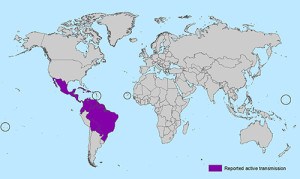

By the end of 2016, nearly four million people may be infected with the Zika virus, according to the World Health Organization.
In fact, the National Center for Atmospheric Research (NCAR) has found that factors like weather, travel and poverty could increase outbreaks this summer. Specialized computer simulations indicate that summer weather conditions could increase the outbreak throughout the East Coast and southern U.S. The agency’s analysis found that winter weather conditions are too cold for the mosquito to survive outside southern Florida and southern Texas.
“This research can help us anticipate the timing and location of possible Zika virus outbreaks in certain U.S. cities,” said NCAR scientist Andrew Monaghan, the lead author of the study.

The study authors said long-range weather forecasts for this summer indicate a 40-45 percent chance of warmer-than-average temperatures over most of the continental United States.
Monaghan said this could lead to increased suitability for the mosquito that carries the virus in much of the South and East, although above-normal temperatures in the hottest regions of Texas, Arizona and California are less favorable for the species.
Researchers said that northern U.S. cities could become vulnerable if a related species of mosquito that is more tolerant to cold temperatures begins to carry the virus.
The virus, which is transmitted to humans by mosquitos, first gained media attention earlier this year when affected Latin America countries, including Brazil, Argentina, Guatemala, Venezuela and Ecuador reported an uptick in Zika, a disease first discovered in Uganda in 1947.
Symptoms of the virus are typically mild, resembling the flu, except that pregnant women can suffer more serious consequences. Microcephaly, a birth defect that may cause an infant’s head to stop growing after birth, is associated with the virus.
Besides affecting health, there are other consequences of this latest disease outbreak.
“Zika virus isn’t going anywhere,” said Frank Esper, MD, infectious disease specialist at University Hospitals Rainbow Babies & Children’s Hospital. “If it’s anything near what happened with SARS or with Ebola, people are going to be very hesitant to travel to those areas.”
Florida Governor Rick Scott declared a state of emergency in four counties where health officials detected the virus.
“This can have a substantial economic impact if this virus gets established in Florida, that people may not be going there,” Dr. Esper said, noting that Canada lost billions of tourism dollars when SARS (Severe Acute Respiratory Syndrome) traveled from China to Toronto while countries like Brazil, which is preparing to host the 2016 Summer Olympics, stand to lose even more.
In addition to tourism, many Latin American countries lack medical infrastructure and resources for early intervention, if they experience an influx of children with developmental disabilities caused by the microcephaly linked to Zika. “You can have a lifetime of disabilities just because you were not able to intervene during that time,” says Dr. Esper.
According to Irfan Akhtar, a pandemic modeling expert at Aon, the main impact of the virus will be on tourism and on business disruption. There are technology and food and beverage companies in South America that are likely to be impacted by Zika. Because there are mild symptoms associated with the virus, it can spread rather easily without being recognized, he said.
University of Missouri researchers say a combination of different strategies is needed to fully tackle the the Zika virus.
“Tackling mosquito-borne viruses requires focus on both humans and insects,” said Alexander Franz, Ph.D., assistant professor in the Department of Veterinary Pathobiology at the MU College of Veterinary Medicine. “While my team is focused on the mosquitoes, other researchers are focused on creating vaccines and therapies for the people infected. Both approaches are needed to successfully stop the spread of the virus.”
Franz’s research is focused on genetically manipulating mosquitoes so they no longer support transmission of mosquito-borne viruses to humans. “Finding a way to make mosquitoes resistant to the Zika virus could effectively interrupt the viral transmission cycle,” Franz said.
Previously, Franz’s research team successfully genetically manipulated mosquitoes to be resistant to the Dengue virus, another mosquito-borne virus affecting people in the tropics.
Franz said his success generating stable resistance to the Dengue virus in mosquitoes could help him tackle the Zika virus.
Daniel Jackson, M.D., a maternal and fetal medicine specialist at MU Health Care and assistant professor in the Department of Obstetrics, Gynecology and Women’s Health at the MU School of Medicine, is concerned with the potential connection of the Zika virus to microcephaly, a permanent birth defect that can cause lifelong developmental problems in infants.
“There is a lot we still don’t know right now about the relation of Zika and microcephaly,” Jackson said. “However, there have been several cases of microcephaly identified in babies also infected with the Zika virus. I advise pregnant women, or women considering pregnancy, to avoid traveling to countries affected by the virus until more research is done.”
Jackson said it is important for expecting mothers to know that having the Zika virus does not guarantee their children will have microcephaly.
Overall, both Jackson and Franz believe it will require an integrated approach to answer all the unknown questions about the Zika virus.